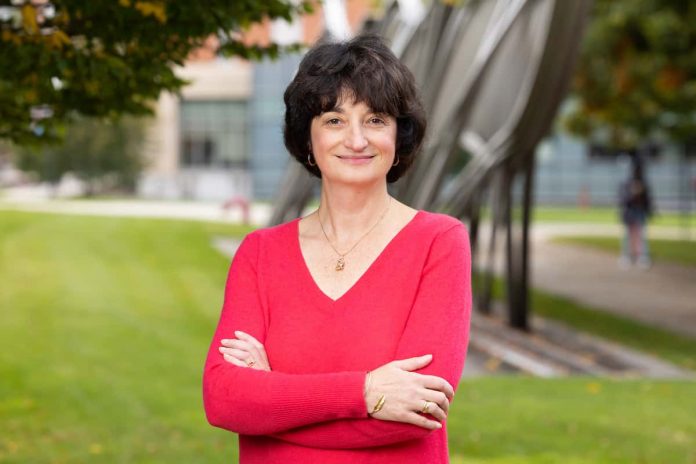Being selected for a prestigious English Language Specialist Project sponsored by the U.S. Department of State has propelled Dr. Elena Schmitt into an educator’s dream. How else could you describe the opportunity to share critical teaching techniques with your peers while helping to foster bonds of diplomacy?
Schmitt, a professor of applied linguistics and coordinator of the master’s in bilingual education and TESOL program at Southern, was born in the Soviet Union, and is one of 240 educators presenting a plenary workshop this semester focusing on World Language Assessment in Russia, at the National Association of Teachers of English (NATE). Schmitt will introduce attendees to a technique that proposes to significantly transform Russia’s lecture-based style into an experiential one for students.
“In Russia, the conditional approach to teaching is more centered around delivery of instruction, rather than the learner becoming an active co-instructor of all meaning and knowledge. When we just lecture to students, the students are not actively involved in learning,” Schmitt said.
Schmitt’s philosophy champions the goal of the State Department’s English Language Specialist Project, to promote person-to-person diplomacy through professional development that helps build bonds between specialists in different subject matters.
In preparation for the program, Schmitt immersed herself in research about the assessment system in Russia, reading everything she could find on the topic. That’s how she uncovered a gap in the teaching process that became the focus of her presentation: the lack of a rubric.
While U.S. educational systems have embraced instructive and experiential language learning, Schmitt found that Russian teachers are not familiar with the concept of rubrics or grading scales that help assess students in a more consistent, objective way with predetermined expectations.
“They don’t use any kind of assessment scale or rubric at all,” she said. “Part of my plenary and focus of my workshop is on helping teachers achieve the goal of rubric in the learning and assessment process, to help them develop rubrics and learn how to apply them in the classroom.”
Without a grading scale, a teacher may be inclined to focus on the shortfalls in a student’s work, rather than on where the student succeeded. A rubric helps teachers take an objective view of the student’s performance, Schmitt explained.
“Using assessment procedures with appropriate feedback procedures is the crucial part of the education,” she said.
The conference of teachers is being conducted online. In addition to the educator presentations, the project includes workshops comprising 50-75 teachers. The participants are teachers of English in K-12 as well as educators in college and technical schools.
The English Language Specialist project gives Teachers of English to Speakers of Other Languages (TESOL) the opportunity to enact meaningful and sustainable changes in the way English is taught abroad. Through projects developed by U.S. embassies in more than 80 countries, English Language Specialists work directly with teacher trainers, educational leaders, and ministry of education officials to share knowledge, build capacity, and establish partnerships that can benefit participants, institutions, and communities in the United States and overseas.
Schmitt has taught in the master’s in bilingual/multicultural education and TESOL program at Southern for more than 20 years. Her expertise on assessment in English and world languages will contribute to the Fulbright Specialist project, working with more than 500 teachers of English in Russia on developing appropriate assessment for their students. Schmitt sees it as an exciting opportunity for productive learning to be shared.
“There are so many important developments that have happened in the U.S. language teaching pedagogy in the last 20 years,” Schmitt said. “A lot of the world is not familiar with them. The TESOL program allows us to make the exchange of ideas possible.”
Schmitt will use a multimedia presentation to demonstrate the effectiveness of a rubric. Through video clips, participants in the program will observe a student whose native language is not English, to listen first without a rubric, and then with one. The exercise is aimed at teaching educators how to understand the levels of proficiency in a student’s grammatical use and structure, pronunciation, vocabulary, and their ability to comprehend questions.
For Russian teachers who are accustomed to a traditional educational system that uses lecture as a primary method, Schmitt’s workshop offers a chance for hands-on learning. She will share rubric documents for the participants to develop together.
“Assessment is not well developed in Russian pedagogy. It’s important to understand there is more to learn. There is a need for more of those types of activities,” Schmitt said. “We also can learn a lot from others, which can really help us be better teachers for kids who come from [other] countries.”
As a product of the K-12 educational system in the Soviet Union, Schmitt never had a rubric as a student. But her passion for learning languages, particularly English, drew her into her future career through her education at Linguistic University in Russia. She moved to the United States in 1990.
Her calling as a language specialist has been rewarding, and now it’s being enriched in an altruistic way.
“You never know what doors learning another language will open for you. This is an opportunity to go back to my educational roots and make a difference,” she said.


